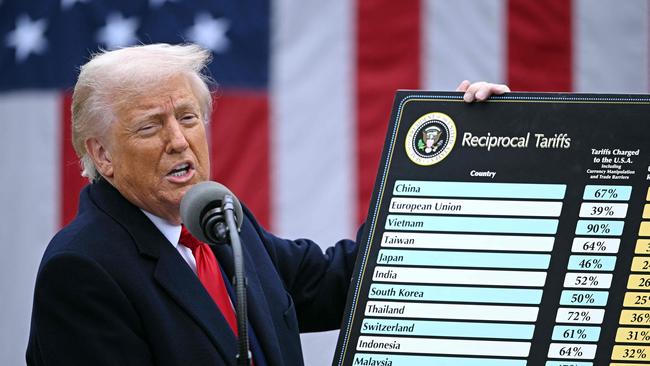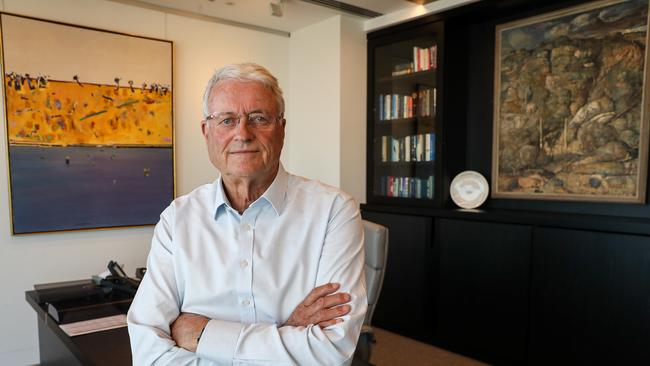Donald Trump’s US court fight: Wesfarmers chair Michael Chaney lashes tariff regime
Michael Chaney has slammed Trump’s global trade war after a US court deemed a sweeping tariff crackdown illegal. But tariffs are staying following an appeal.

Wesfarmers chairman Michael Chaney has seized on a US court decision to block Donald Trump’s tariffs with a fresh attack on the punitive levies, warning business and investor confidence has not recovered since the trade war was put on ice.
Mr Chaney, one of Australia’s top business figures, told The Australian the tariff stoush must come to an immediate end to arrest ongoing volatility across the global economy.
“Regardless of the legality or illegality of the tariffs, they don’t make any sense economically given the tariffs originally proposed would not only have caused huge ructions internationally, but would have devastated the American economy,” said Mr Chaney.
“It’s that realisation that no doubt caused President Trump to defer or reverse and chop and change. And none of that is helpful for any economy.”
Federal Trade Minister Don Farrell said on Thursday the Albanese government was reviewing the implications of a US Federal Court decision to bar Donald Trump’s so-called “Liberation Day” tariffs, which have fuelled international geopolitical tensions and roiled global markets.
Lawyers for the Trump administration have appealed the decision.
A federal appeals court put a temporary hold or administrative stay on ruling - meaning the sweeping tariffs will remain in place for now.

Markets were upended when the US President’s regime was announced on April 2 and while a series of reversals and deals have softened the fallout, Mr Chaney said there had been damage to investment risk.
“It’s the uncertainty that it causes that results in people not making investments and being too unsure about the future to make investments and to employ people. And the sooner the whole set of tariff proposals is dropped, the better for everyone,” said Mr Chaney, a former chairman of Woodside Energy.
Anthony Albanese is expected to push for an Australian exemption from any future US-imposed tariffs when he attends the mid-June G7 summit in Canada, to which Mr Trump is also invited.
“I think Australia should be exempt, and every country should be exempt. The tariffs, as any economist knows, have a negative effect,” Mr Chaney said.
Wesfarmers is one of the country’s largest private-sector employers, with low-cost retail businesses Kmart, Target, Bunnings and Officeworks.
Australian businesses have been waiting for a resolution on tariffs and had been holding off changing shipping or trade routes in the last few months, according to the Freight and Trade Alliance.
“I don’t think anyone’s jumping at shadows at this point in time,” said Tom Jensen, FTA general manager for freight policy and operations.
“Initially there was a worry that we might see a lot of blank sailings or cancellations into the Australian market, but it’s been quite the opposite in the last month, where we’ve gone from a 10 per cent cancellation rate down to four per cent.”
Commonwealth Bank analysis found the volume of Chinese trade within its ports was close to its post-pandemic average despite the steep increases in US tariffs on imports from China between February 1 and the 90 day US-China trade truce agreed on May 12.
“Port activity is consistent with the resilience of the Chinese official export and import volume data,” CBA said.
When will Trump’s tariff regime end?
Still, Capital Economics said the court ruling had introduced a fresh layer of uncertainty on top of the ongoing negotiations over the US President’s tariff regime.
“The ruling will obviously throw into disarray the administration’s push to quickly seal trade deals during the 90-day pause from tariffs that have now been declared to be illegal. Other countries will wait and see whether a higher court is willing to reverse this ruling,” Capital Economics economist Paul Ashworth said.
Product-specific tariffs on steel, aluminium and motor vehicles which were imposed under the standard trade laws following Section 232 investigations will likely remain in place, according to Capital Economics.
Goldman Sachs also cautioned that Washington may seek to use the cloak of the Section 232 tariffs to add other at-risk sectors.
“We already expect additional sectoral tariffs (pharmaceuticals, semiconductors/electronics) and uncertainty regarding the IEEPA-based tariffs could lead the White House to put more emphasis on sectoral tariffs, where there is much less legal uncertainty,” Goldman Sachs said.
“President Trump has not emphasised sectoral tariffs as frequently lately as he did earlier this year, but if the White House finds it has less flexibility on country-focused tariffs, sectoral tariffs might receive more attention again.”
Australia’s largest steelmaker, BlueScope, said earlier in May the Albanese government will send a trade delegation to Washington to resolve a tariff stoush with Mr Trump amid fears among executives that the trade war will revive the world’s inflation problem.
BlueScope’s Port Kembla steelworks exports 200,000 to 300,000 tonnes a year to the US but chief executive Mark Vassella expects that “net-net” the tariffs will be a positive for the firm as US steel prices rise.
BlueScope has been investing in the US for 30 years and recently spent $2bn on acquisitions and brownfields expansion of its operations, including at North Star.



